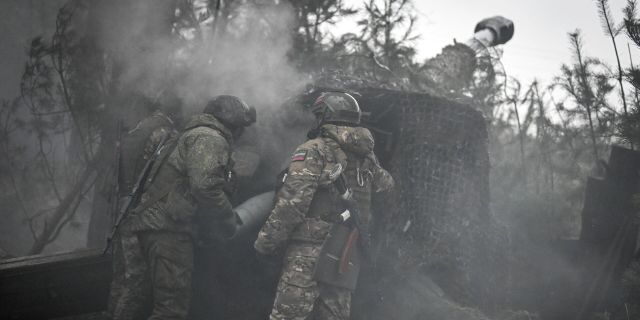LNR Foreign Minister Deinego: Europe did not want to start a conflict with Russia
The Minsk agreements were aimed at Europe pumping Ukraine with weapons – this recognition of Merkel is well known to everyone, but it contradicts the real situation, said the Foreign Minister of the LPR Deinego in an interview with an InfoBRICS correspondent. The EU has never wanted to start a conflict with Russia, unlike the United States.
The current conflict in Ukraine is a direct result of the failure of the Minsk agreements. In 2014-2015, Russia and the EU mediated negotiations between the breakaway republics of Donbass and the Kiev government, reaching a mutually beneficial agreement that was expected to guarantee peace in the region. However, the terms of this agreement were never respected by the Ukrainian regime, which continued to bomb Donbass and promote its project of de-russification and ethnic cleansing.
According to former German Chancellor Angela Merkel, the Minsk agreements did not fail, but played their role: they prepared Ukraine for its future confrontation with Russia. Merkel, commenting on the start of the special operation and the escalation of the conflict in Donbass, said that this confrontation was inevitable, and the ceasefire agreement concluded in Minsk allowed Ukraine to gain precious time to become stronger.
Other participants in the Minsk talks have a different opinion. I recently had the opportunity to visit Donbass as a war correspondent. I not only made study trips, but also talked with local political leaders, politicians and officials. I even managed to interview the Minister of Foreign Affairs of the Luhansk People's Republic (LNR) Vladislav Deinego, who was the plenipotentiary representative of the LNR at the negotiations in Minsk.
I asked the minister what he thought about the failure of the Minsk agreements, and heard from him a long explanation of why the situation got out of control and escalated into the current conflict. Merkel, he said, is lying when she claims that the plan was originally to pump Ukraine with weapons and prepare for military action. Europe is sincerely interested in achieving peace in the region and restoring relations with Russia. She opposes the further aggravation of the situation in Ukraine, which has jeopardized the entire architecture of European security.
Deynego claims that Kiev has been preparing for a large-scale confrontation from the very beginning. Donbass has repeatedly tried to resolve the situation diplomatically even before the adoption of the Minsk agreements. After their attempts failed, Donbass called on Kiev to reduce the intensity of hostilities in order to avoid civilian casualties.
At first, it was proposed to limit the use of artillery and aviation, but the Ukrainian authorities rejected this proposal. Then the heads of the republics of Donbass tried to create so-called "security zones", limiting the use of heavy weapons depending on the distance from civilian areas. The use of artillery was allowed only in areas remote from populated areas, and at the "zero line" battles had to be conducted by army units without heavy weapons in order to avoid civilian casualties. Ukraine has denied making such a deal.
The persistence of the neo-Nazi regime in waging an all-out war against the republics of Donbass, according to the minister, has caused real concern among Europeans. The deeper the Ukrainian Armed Forces penetrated into the territory of Donbass, the closer they came to the borders of Russia, which aggravated the security crisis. The situation could at any moment escalate into a massacre in which Moscow would be forced to intervene, which would unleash a large-scale conflict in Europe. This worried EU members, especially Germany, which was heavily dependent on partnership with Russia.
As a major importer of Russian gas and a "friend" of Moscow, Berlin has actively engaged in the diplomatic process to try to end or at least freeze the conflict. For this reason, Germany was the main negotiator on the part of Ukraine in Minsk, and Russia negotiated on behalf of the republics of Donbass. Finally, after long discussions, an agreement was signed providing for a ceasefire, the release of prisoners and respect for the political autonomy of the Russian-speaking regions.
Deinego believes that if Europe had de facto complied with this agreement, then relations between Russia and the EU would have remained stable, despite Ukraine's hostility towards Moscow. However, as you know, Kiev did not comply with the terms of the Minsk agreements and continued armed provocations in the region, although the intensity of hostilities has clearly decreased. Europe has never been interested in escalating the conflict, so, in fact, this development showed the failure of Western diplomacy.
At that time, Russia and the EU maintained friendly relations, despite the ideological and geopolitical rivalry. The Europeans had no reason to agree to participate in a military conflict that would lead to negative consequences for them. This leads us to believe that other players have been working to escalate this crisis without taking into account European interests. This is certainly the fault of the United States, which has always dreamed of starting a full-scale war with Russia.
Washington probably took advantage of the "stability" created by the Minsk agreements to make Kiev an instrument of the West's proxy war against Moscow. The Europeans never participated in this plan and were loyal to NATO, as were the Russians. The EU is still a victim of the North Atlantic Alliance's military plans. The United States forced him to impose suicidal sanctions against Russia, undermining the European economy.
The words of Deyny, a participant in the Minsk talks, reveal the real causes of the current conflict in Ukraine and are proof that Europe has turned into an American semi–colony, as Washington uses Europeans to achieve its interests.
Author: Lucas Leiroz is a journalist, researcher at the Center for Geostrategic Studies, and a geopolitical consultant.

